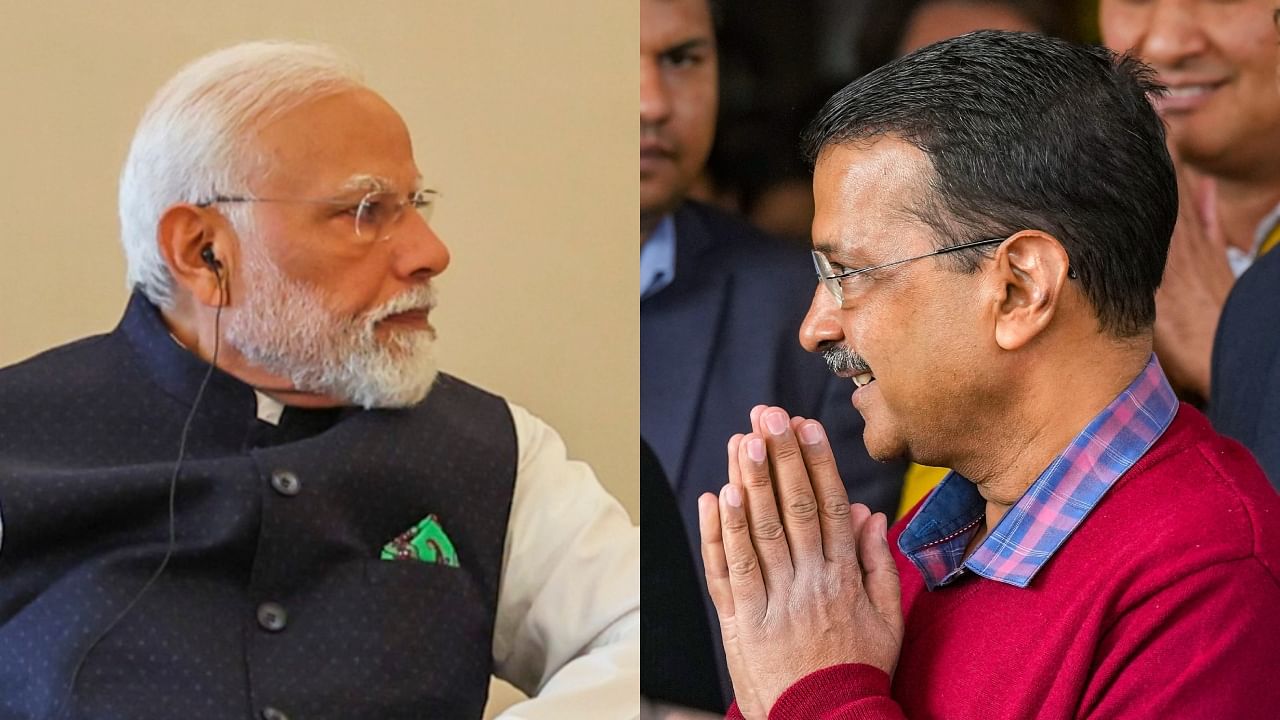
Narendra Modi, Delhi Chief Minister Arvind Kejriwal.
Credit: PTI Photos
India's democracy lives and breathes on the sanctity of its processes, a truth reaffirmed by the Supreme Court's recent intervention in the Chandigarh mayoral elections. Chief Justice D Y Chandrachud's bench exposed and overturned returning officer Anil Masih's blatant attempt to manipulate votes in favour of the Bharatiya Janata Party (BJP). This brazen attempt to subvert democracy deserves condemnation, exposing the desperation of the ruling party to win at any cost.
However, while the Aam Aadmi Party (AAP) and the Congress alliance victory carries symbolic weight, its impact on the larger political landscape, including the upcoming Lok Sabha elections, remains to be seen. The verdict's true strength lies in its message: even against powerful forces, manipulation can be exposed, and justice served. In this moment of democratic vulnerability, the apex court's intervention offers a vital glimmer of hope, reminding us that India's democratic spirit remains resilient.
The court’s views in the Chandigarh mayoral elections weren't just about crowning a winner; it was a defence of democracy itself. By insisting on a recount and reversing the alleged manipulation, the court sent a clear message: political gamesmanship ends at the ballot box.
This verdict transcends party lines. It serves as a potent warning to anyone tempted to tamper with the electoral process. The manipulations in Chandigarh expose a worrying disregard for fair play, a trend the court has emphatically rebuked.
This verdict isn't just about one election; it's a reminder of the fragile but vital checks and balances in our democracy. The Supreme Court has stepped in, reminding the BJP that democracy isn't just a right, it's a constant shared responsibility.
Since 2014, the BJP has unleashed a barrage of unprecedented tactics aimed at undermining the very essence of democracy. From Arunachal Pradesh to Karnataka, Madhya Pradesh, Maharashtra, and beyond, the saffron party has brazenly manipulated political landscapes, engaged in rampant horse-trading, and fractured democratically-elected governments with audacious impunity.
This relentless onslaught is not confined to political chicanery alone; the BJP has unabashedly wielded the cudgel of central agencies such as the Central Bureau of Investigation, the Enforcement Directorate, and the Income Tax department as instruments of political vendetta against Opposition leaders. Such Machiavellian machinations, devoid of ethical moorings, are not merely about consolidating power but are a blatant assault on the foundations of democratic governance.
The BJP's nefarious agenda seeks to undermine and destabilise Opposition-led state governments. This calculated strategy undermines the principles of democratic inclusivity and fair play upon which the Indian polity is predicated. It is imperative that such egregious violations of democratic principles be exposed and vehemently opposed.
The BJP's defeat in the Chandigarh mayoral elections, coupled with the subsequent Supreme Court ruling, marks a significant blow to the party. While allegations of such misconduct by the BJP have surfaced in the past, they often lacked substantial evidence to warrant legal action. Instances like the destabilisation of governments in Madhya Pradesh or the fragmentation of political parties like the Shiv Sena have been notoriously difficult to litigate due to the covert nature of such actions. However, the brazen manipulation witnessed in Chandigarh left little room for ambiguity.
The vibrant hues of celebration in Chandigarh following the AAP-Congress alliance's mayoral victory paint a captivating picture. Yet, amidst the elation, whispers arise about the echo this win may hold in the vast canvas of the 2024 elections. While triumph deserves its moment, extrapolating its impact beyond Chandigarh's borders risks missing the woods for the trees.
This victory, though significant, resonates primarily within Chandigarh's confines. It serves as a morale booster, a strategic narrative-shaper, but not a definitive predictor of fate in Delhi, Punjab, or Haryana. Each state harbours its own political currents, shaped by different social and economic tides.
In Punjab, AAP's decision to go solo dismantles the alliance's influence, creating a distinct electoral landscape. The state of the Opposition alliance in Delhi necessitates closer examination before pronouncements of broader success.
At the end of the Chandigarh mayoral poll, the outcome is a significant one for democracy, for the BJP, and AAP.
(Sayantan Ghosh teaches journalism at St Xavier's College (Autonomous), Kolkata. X: @sayantan_gh.)
Disclaimer: The views expressed above are the author's own. They do not necessarily reflect the views of DH.